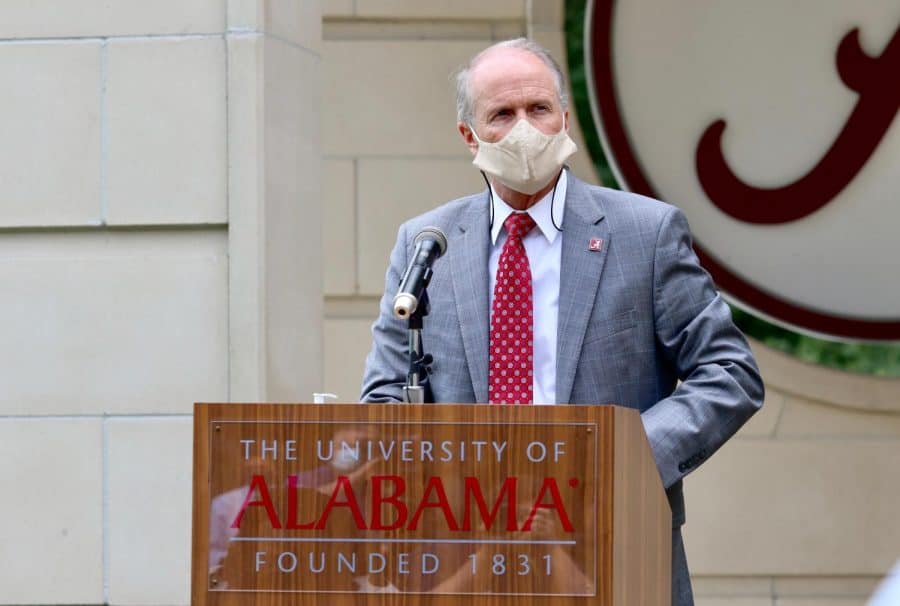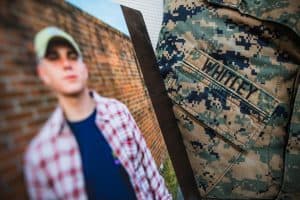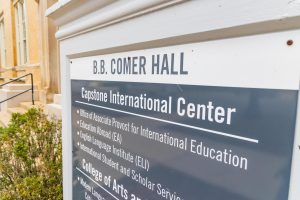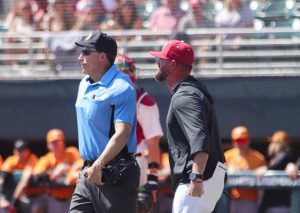How does UA make COVID decisions?
UA President Stuart Bell spoke at a COVID-19 press conference in August 2020.
March 2, 2022
Since the onset of the COVID-19 pandemic, the University has been navigating a changing landscape. As the University approaches the two-year anniversary of sending students home for half of a semester of virtual learning, information about how COVID-19 policy decisions are made is scarce.
College of Community Health Sciences Dean Richard Friend confirmed on a phone call on Jan. 19 that UA President Stuart Bell has final say about COVID-19 policy decisions at the University. Friend said the Situation Response Team is advisory to Bell’s office.
Bell’s office did not initially acknowledge his role in the decision-making process surrounding COVID-19 policy on campus in his first statement on Feb. 19 released through Beverly Baker, administrative assistant to the president.
“UA Situational Response Team evaluates conditions on campus and surrounding communities and consults with [the Alabama Department of Public Health] when making recommendations about campus guidelines, processes and protocols,” the statement read.
Bell’s office said on Feb. 24 that, as with all campus policies, campus units propose policies to senior leadership for approval.
“By nature of his position, President Bell is responsible for the overall leadership of this institution,” the statement read.
On the University’s official coronavirus website, the Situational Response Team is described as “consisting of representatives and experts from [Bell’s] office, Academic Affairs, Finance and Operations, Health Sciences, IT, Research, Strategic Communications, and Student Life.”
According to a list provided by Bell’s office, two of the 15 members of the team are medical professionals — Friend and Karen Burgess, the interim executive director and medical director of the Student Health Center.
Bell’s office noted that the list of members provided to The Crimson White consisted of current members and did not include previous members of the team or members added to address issues at a specific time.
Other members of the team include Steven Hood, interim vice president for student life; Ryan Bradley, vice president of strategic communications; and Donald Keith, director of emergency management.
In its initial statement on Feb. 19, Bell’s office said that “campus responses to COVID-19 have adapted to meet the policies, guidance and mandates issued by local, state and federal governments, the Alabama Department of Public Health, and the Centers for Disease Control and Prevention.”
There have been multiple documented instances of COVID-19 policies not following the recommendations issued by the CDC. In November 2020, the University lifted a mask mandate despite county transmission being above the CDC’s threshold to recommend indoor masking.
At the time, the CDC’s guidelines said that individuals in communities where transmission levels were over the “substantial” threshold should wear masks indoors. According to the ADPH, high transmission was defined as at least 100 cases per 100,000 people, or a 10% or greater positivity rate.
As of Feb. 25, the CDC has changed its masking guidelines to reflect hospitalizations and bed availability instead of community transmission. Under the old guidelines Tuscaloosa county would have “high” transmission, but with the new guidelines the county falls into the “medium” category, which allows for unmasking indoors, regardless of vaccination status.
In early February the University announced that it would begin phasing out COVID-19 services over the course of the semester, starting with the end of the mask mandate implemented in response to the omicron variant. When the announcement to lift the mandate was made, and when it was lifted on Feb. 21, CDC regulations still recommended masking indoors, regardless of vaccination status, in areas of high transmission.
The announcement scaling back the University’s COVID-19 response — including the end of the mask mandate — came a week after the State Health Officer Scott Harris expressed reluctance to declare victory over the pandemic.
“We still know that there’s a lot we don’t know, and we’ve seen previous surges before, so we’re just a little careful to declare victory at this point,” Harris said in an interview with WFSA 12 News.
The Crimson White submitted two open records requests last semester seeking information about COVID-19 policymaking decisions. In one response, the University provided a list of groups who made recommendations on policies, but did not disclose the decision making process.
The University’s coronavirus website frames the Situation Response Team as the the decision makers for COVID-19 policy, but Friend, a member of the team, said Bell is the one with that power. The website does not mention that final decision-making power lies with Bell.
Some SEC schools have shared detailed information regarding who makes their policy decisions. Auburn University spokesperson Mike Clardy said in a statement that “COVID-19 related decisions at Auburn ultimately lie with the president.”
“Since the onset of the pandemic in 2020, the University has relied on the guidance and expertise of an advisory committee, which includes the medical director, among others, and follows guidance set forth by the CDC,” Clardy said.
In contrast, the University of Florida’s policies are constrained by multiple state laws curbing pandemic response options available to schools. Under these laws, schools are prohibited from enacting mask or vaccination mandates for their employees or their students.
Alabama has similar laws curbing vaccine mandates made by schools and employers. Act No. 2021-493 details rules regarding vaccine passports and prohibits universities in the state from requiring vaccinations as a condition for attendance for students, with exceptions for immunizations that were required before Jan. 1 2021.
Act No. 2021-561 prohibits employers from firing employees due to not having a COVID-19 vaccine and requires employers to provide religious and medical exemptions for a mandate to anyone who fills out the proper paperwork.
UF spokesperson Cynthia Roldán Hernández said “only the state of Florida can mandate vaccines” in an email.
“UF has begun treating COVID as other contagious illnesses such as the flu,” Hernández said. “The university continues to monitor the campus environment and will change along with it when needed.”
Richard Friend did not respond to multiple interview requests. Friend’s confirmation on Bell’s decision-making power came from an interview conducted before this reporting process began.
This story was published in the Health Edition. View the complete issue here.
Questions? Email the news desk at newsdesk@thecrimsonwhite.com.





















